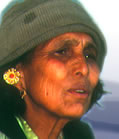THEMES IN THIS
TESTIMONY
Agriculture

Communications

Conflict

Development

Education

Employment and Income

Environment

Family Life

Migration

Social Relationships

Click on arrows
to find more
testimonies
featuring
these themes
|
|
Sex
|
Female
|
|
|
Age
|
47
|
|
|
Identity
|
Tamang
|
|
|
Occupation
|
farmer
|
|
|
Location
|
Kavre district
|
|
|
Date
|
2002
|
|
summary
An interesting testimony ranging over several subjects, including migration. Sanumaya has effectively been head of her household for many years, working long hours farming (she gets up at 4 am, and has “no free time”). The interview took place in the rainy season and Sanumaya comments, “Today it rained and I got a little free time to talk to you and I feel happy.” Her husband works in Kathmandu, returning at weekends to instruct any labourers about tasks for the coming week and to take care of vegetable cultivation. Working so hard has aged her more than her husband, she feels, with his “comfortable” waged job in the city.
Much of the testimony is about changes in agricultural practices, social customs, attitudes and lifestyle that have taken place since she was a child. She considers life to be better than before: the village now has piped water, electricity, roads (and television) linking them to the outside world. She is fairly sanguine about the high levels of male migration villages like hers experience, recognising that her husband’s wages have enabled them to educate their children and give them opportunities denied to her own generation. She also thinks that migration makes the men - otherwise “dumb like a sheep” - wiser; they bring back new ideas and ways of doing things.
She takes a liberal attitude towards some social changes. In her day, marriages were arranged: “Girls had no choice, [no way] of saying I don’t want to marry him, don’t want to go. [My] marriage was done that way. Otherwise…why would I have ever married and come to this troublesome place?” Caste prejudice has, she says, largely disappeared; her relations with higher caste women are good – they live together as if they had a “common courtyard” – but there is still discrimination against blacksmiths, tailors and cobblers. And although she would prefer her daughters to marry within their caste, she wouldn’t oppose their marrying “good” men from another.
One negative change locally is the loss of the forest, which she ascribes to population growth and lifted restrictions on collecting firewood and fodder. But in general she feels “… these days when we talk of hardship it’s not the type we had in the old days when one had to walk far and carry heavy loads, but our hands are not free for a moment.” The other negative change is the constant anxiety and fear engendered by the Maoist insurgency: “Dusk and dawn are the times to…fear [the Maoists] now …it’s not free in the village these days.” But she ends with a strong statement about the benefits of life in the hills: “Here we have such a refreshing climate. How beautiful the place is too. We can survive on gruel and porridge only, can survive on climate only. The water in our place is so good. If you are hungry just gulp half a litre of water and your hunger also will disappear; our water has that much strength…”
detailed breakdown
|
You will need a password from Panos to view the full
transcript of the interview. To apply for a password, click here.
Once you have a password, click here to go to the beginning
of the transcript. You can also click on any section of the
breakdown of content below and go straight to the
corresponding part of the transcript.
|
| Section Section 1-3 |
Parents live in same area (“up there”). Has 2 daughters, 1 son.
Her marriage was arranged. If she’d had her way, “I would have gone to another place, a better place, and not come to this poor place.”
Husband has worked in Kathmandu for 22 years, returns at weekends. She looks after household and farm; describes tasks of a long day.
Forest: “Gone. Completely. There are a few trees so there is less fodder and sotar (grass/leaves) for us to bring. There is nothing left in the forest except thorns.” In past got plenty of firewood and fodder. Forest guard restricted amount collected. No restrictions now. But people now afraid to go into forest – “…sometimes for fear of thieves.”
|
| Section Section 3-5 |
Agricultural changes. New crops (mustard and wheat); before, only maize, barley, millet; no one grows millet now. Fertiliser – “this foreign manure” – results in bigger harvests and more work.
“Present day children do not even want to eat millet porridge. These days, kids say millet porridge is chicken manure. They want to eat rice only.” She puts this down to “temptation and craving for things in shops”. She adds: “People have given up eating barley, too. All good things have been given up…everything of the past.”
More on changes in diet.
|
| Section Section 5-7 |
Animals kept. In her childhood they had one buffalo and many cattle which she tended. Had cows in first years of marriage, now none because hard to sell them; so started raising buffaloes and goats.
Big increase in vegetable growing since introduction of piped water. “There are differences in ways of eating, dressing, speaking and even ways of behaving…so many differences…”
Better roads and transport: “Before one had to go on the downward slope shivering on the slippery track in rain, with a load on your back and a stick for support.”
Now they plant utish trees for fodder and firewood in own fields.
|
| Section Section 7-10 |
Changes in social customs. Elders in the past: “If they saw daughters and daughters-in-law sitting idle for a moment they would come forward to rebuke us, asking how we dared to stay inside the house lolling around and expect to eat what they had…stored.”
In past only ate meat on special occasions/at festivals; now once or twice a month. Same for eating rice. Children now “spoilt”, used to eating rice. “You cook porridge one day and the children will put on gloomy faces.”
All three children being educated. Youngest daughter at boarding school. She and husband uneducated, therefore “one-eyed”, but wanted better opportunities for children.
Boys/men of village mainly go away to work, in or outside Nepal. Approves of this: “They earn and bring [money] home. They come back a little more educated, come back with new ideas and understanding, teach new things to children.”
No alternative now to migration and the cash economy, but it does bring an increased physical burden for her, with husband working in city: “If you have a male at home he will clear a heap of dung.”
|
| Section Section 10-12 |
More about benefits of working outside. “They have learnt that we should not abuse others. If [my husband] had remained at home, he would have been dumb like a sheep.”
At weekend husband organises farming tasks, instructs hired labourers.
He provides enough money for all their needs and doesn’t like her asking how much he earns.
Before, village men often got into drunken brawls, gambled, beat their wives; she feels it’s better they’re now employed elsewhere, not least because: “They do not earn money only when they go out; they also bring wisdom with them.”
Has visited Kathmandu only rarely. “I do not get time… Household work never leaves you.” Her husband does not encourage her to stay.
Account of getting lost in Kathmandu on visit with son.
|
| Section Section 13-14 |
21-year-old daughter studying nursing at Banepa campus. Daughter not yet willing to marry. “Now when you tell her that people have come with a marriage proposal… she says no… And once she says no you cannot put pressure [on girls] these days.”
Caste: “No, it is not there these days like before, that issue of caste discrimination. Very few cases are still there…. Except for blacksmith, tailor and shoemaker all others are accepted now.” Describes former marriage restrictions, based on high and low clans and family groupings within Tamang ethnic group.
|
| Section Section 14-15 |
Would prefer daughter to marry within her own caste, otherwise marriage ceremony will not be acceptable to “our family god”, but will accept her marrying a “good boy” from another caste. “If she lands up in the wrong hands she has to face destiny as it is written for her.”
Children speak Tamang and Nepali; she doesn’t speak Nepali (“hill language”) well but says, “I feel shy to speak Tamang in front of others. Therefore whenever I go out I speak broken hill language.”
|
| Section Section 16-18 |
Relations with Jaisinis (higher caste women). “We live together as if we had a common courtyard…Their time to despise us has gone.”
Describes how Bahuns and Chettris used to treat them, insulting them with names which stressed the fact that they eat meat and drink alcohol. Says they made them work without payment when they had to borrow grain in times of shortage, and cheated them over measurements. “But now if they try to oppress and order us to work for nothing then we straightaway tell them that we are not their slaves and servants.”
Says upper castes, who by tradition didn’t drink alcohol until recently, are now much more likely than Tamang to drink to excess.
Stresses that “Life is more comfortable than before but women’s responsibilities have not decreased.”
|
| Section Section 19-21 |
Graphic description of constant problem of leeches. Now that people don’t collect forest products they don’t suffer in this way.
Fear of Maoists: “Now you want to get up early and open the door to do some work but you are haunted by the feeling that a Maoist may be already there… Before, you could leave your door open the whole night without any fear.” No direct contact with Maoists but many reports on TV.
Husband three years younger than her and still youthful because of “comfortable life” in Kathmandu, whereas she has aged. If her husband took a second wife she’d have “no worry” and would “live in comfort”, but thinks it unlikely he will do so.
|
| Section 21 |
Doesn’t like Kathmandu. Talks of the “refreshing climate” and beauty of her own environment. Besides, “The water in our place is so good” whereas in the city the water smells and tastes nasty and food isn’t tasty. |
|


